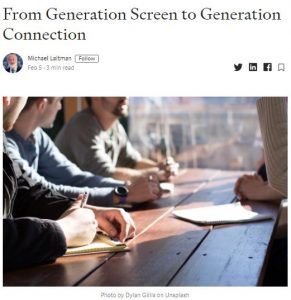
A lot of criticism has been raised about the younger generation trapped in virtual space day and night behind computer screens and mobile devices. Various detractors say that this is a lifeless generation lacking proper brain development, communication skills, imagination, and that they have sunk into themselves, buried between rows of words and myriad images. “Generation Screen,” however, is more adept than any previous generation at discerning the deadly disease of persistent self-centeredness festering within our world.
As the accurate diagnosis of a disease in its early stages gives us a great advantage to heal it, so “Generation Screen” brings forth the gift of “the recognition of evil,” i.e., the awareness of the destructive nature of the human ego — the desire to enjoy at the expense of others — residing within each of us as being the source of all our problems. Without such a realization, we cannot expect any positive forward progress, any healing of our disease.
However, where our screen generation can reach a significant recognition of evil, the solution to the problem cannot be done through the same screens magnifying the problem. Books, too, although known to work more positively on brain development, improving linguistic, writing, imagination, listening and learning abilities, originally emerged as a disruption that spoiled a more natural word-of-mouth conveyance of wisdom from teacher to student.
In the distant past, teachers of wisdom sat on hills and under trees, surrounded by circles of students, and would deliver words of wisdom, teaching through conversation and interaction. We can thus learn from past conversational learning formats in order to approach a solution to our current problems.
In an atmosphere of friendliness, warmth, sympathy and support for one another, we can build positive connections above our egoistic impulses in a spirit of open discussion. In other words, when we acknowledge how our technological, scientific and cultural progress has been paralleled with a decline in the quality of our connections, then we can pair the desperate need for healing our connections with the method of connection, which was perfected in the educational methods of our sages, in order to find the cure to our current state.
When wisdom needed to be conveyed by word of mouth, our learning required attentive listening in order to understand what was being discussed, and in order to internalize and add the material to our memory reserve. Students would listen, ask questions and converse in order to gain knowledge and wisdom. In their circles, they would absorb the spirit of the material being taught. Through a conversational and social approach, students would connect among each other and with their teachers face to face.
Therefore, our challenge to correct the evil inherent in human nature today is to learn how to positively connect above our divisive drives. At the center of our discourse should be the understanding of such a need, and the impetus to balance ourselves with the law of nature that moves everyone and everything toward more and more unified states.
Our conversations would then gradually advance us in understanding and feeling a more powerful desire to positively connect with much greater mental and emotional aptitude. Our brains would then develop alongside our more developed hearts, as we would gain access to the ultimate unifying device for dealing with any problem and form of division that would appear between us.
Featured in Medium